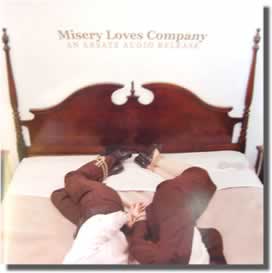Misery Loves Company
- title
Misery Loves Company
- label
Ersatz Audio
- format
- various artists CD / series of three 12inch singles
 When the New York Times personified the electro movement in their 80's revival feature, their selection of Adult.'s Adam Lee Miller and Nicola Kuperus seemed the most logical. In a scene where the artist is generally shrouded and left inanimate behind their DAT's and synthesizers, the chrome-on-white, mechanistic look of Adult., always photographed together but with noticeable distance between them, seems to emerge directly out of their music.
When the New York Times personified the electro movement in their 80's revival feature, their selection of Adult.'s Adam Lee Miller and Nicola Kuperus seemed the most logical. In a scene where the artist is generally shrouded and left inanimate behind their DAT's and synthesizers, the chrome-on-white, mechanistic look of Adult., always photographed together but with noticeable distance between them, seems to emerge directly out of their music.
The latest compilation on their Ersatz Audio imprint, Misery Loves Company, features Adult. and eleven artists all seeking to push the boundaries of the sound Adult. seemed to perfect on their previous 12''s. While mass media may constantly link the synth grooves of electro with those of the first New Wave artists in the eighties, the artists on Misery Loves Company owe a lot more to the musical and social dimensions of tomorrow.
Generally Eighties electro, in its quirkiness and poppiness, seems like a throwback to bygone, happier times. Oppositely, Misery Loves Company is a kind of desperate dancefloor invitation. In the hard rhythms, clanging, metallic synths, and densitized declarations like 'You need color- in your cheeks, No weekend for you this week' from Solvent and Skanfrom's 'Expect Delays' and 'Over tired and undesired, you've acquired the right to expire' from Adult.'s 'Paranoid Vision,' the artists on Misery Loves Company dispassionately embrace these isolated, disconnected times.
Interestingly, Misery Loves Company is a dance comp, and Adult and their brethren center their darker, heavier beats around that random dancefloor encounter and the promise of strobes and sweat. The Lowfish and Kitbuilders tracks achieve this frenzy the best. Also notable are the catchy absurdity of Magas, as well as the Gold Chains track 'Could Care Less' with its rousing epithet 'F**k the f**k' capturing the scene's existential undercurrents and sexual politics like nothing since 'Hand to Phone.'